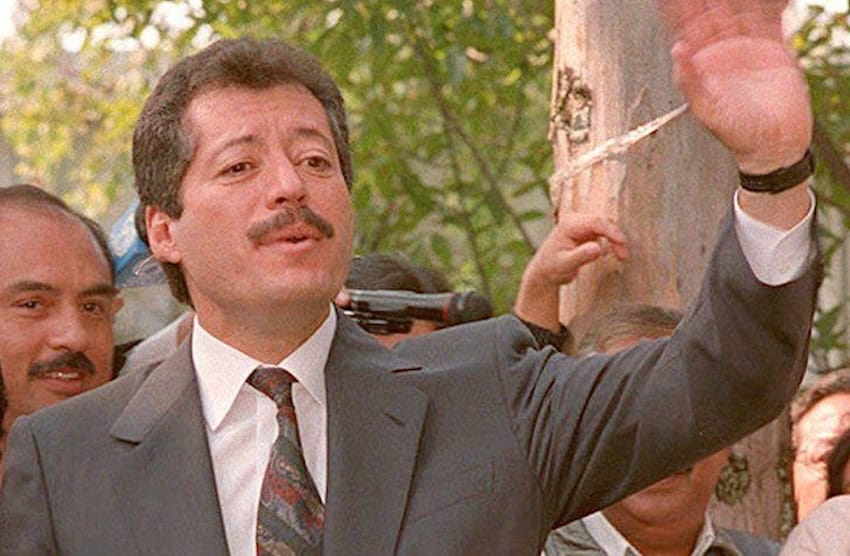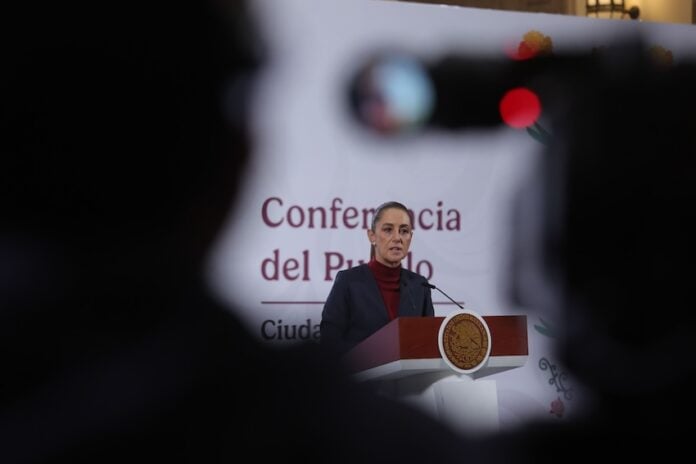Tourism Minister Josefina Rodríguez Zamora took center stage early in President Claudia Sheinbaum’s Friday morning press conference, reporting that the number of international tourists — that is, foreigners who spent at least one night in Mexico — increased 6.4% annually in the first nine months of 2025 to reach 34.7 million
She also presented a new tourism strategy for the Caribbean coast resort town of Tulum — “Tulum Renace” (Tulum is Reborn), which focuses on making the destination “fairer, safer and more sustainable.”

·
Sheinbaum noted that one of the first actions of the strategy was the establishment of free access to beaches in Tulum, where lower-than-normal hotel occupancy rates and a sagging economy have recently caused concern.
Later in the press conference, the president responded to questions on a range of topics, including the government’s plan to legislate a 40-hour workweek and the three-decade old case of the assassination of a presidential candidate.
She also noted that many of the nation’s children aren’t entirely happy with her government’s actions.
40-hour workweek proposal could be presented to Congress this month
Sheinbaum told reporters that her government is continuing to work on a constitutional reform bill aimed at reducing Mexico’s standard workweek from 48 hours over six days to 40 hours over five days.
“I hope that the proposal can be presented [to Congress] this month,” she said.
Citing unnamed sources, the El Economista newspaper reported on Thursday that it was expected that the proposal would be submitted to Congress next Thursday Nov. 20, Revolution Day in Mexico.
Labor Minister Marath Bolaños said earlier this year that the government would gradually install a 40-hour work week before the end of Sheinbaum’s term in September 2030.
The president said on Friday that her administration is seeking “an agreement on the outline of how the 40-hour workweek will be implemented.”
She has previously highlighted the importance of consulting workers, union leaders, private sector representatives and others on how to transition from a 48-hour workweek — as set out in the Mexican Constitution — to a 40-hour one.
Sheinbaum stressed at the mañanera that her government is in favor of a 40-hour workweek, but wants the process required to get there to have input from all interested parties. She said that has been the case to date, and that “conflicts” have been avoided as a result.
In 2023, a committee of Mexico’s Chamber of Deputies approved a bill to reduce the workweek to 40 hours, but the proposal wasn’t passed by the full Congress.
New development in the 31-year-old Colosio case
A reporter noted that a former agent of the now-defunct Center for Investigation and National Security (CISEN), Jorge Antonio Sánchez Ortega, was arrested in connection with the 1994 assassination in Tijuana of Luis Donaldo Colosio, who was preparing to contest the 1994 presidential election as the candidate for the then-ruling Institutional Revolutionary Party, or PRI.
The Federal Attorney General’s Office (FGR) revealed early last year that it had formally accused Sánchez of firing one of two bullets that struck the 44-year-old politician on March 23, 1994. However, the evidence the FGR presented to a court in January 2024 was not able to convince the presiding judge to issue a warrant for his arrest.
Mario Aburto, who was convicted of murdering Colosio, remains in prison even though in late 2023 a federal court annulled the 45-year sentence he was given in December 1994.
On Friday morning, Sheinbaum acknowledged that a warrant had been issued for the arrest of the alleged “second shooter” — i.e. Sánchez Ortega.

She also noted that former president Andrés Manuel López Obrador “effectively” said at one of his mañaneras that “this second shooter” was “allegedly taken out” of the Lomas Taurinas neighborhood of Tijuana — where the assassination occurred — by Genaro García Luna, a former federal security minister who worked for CISEN at the time. The implication was that García Luna helped Sánchez to avoid being implicated in the crime, even if he didn’t actually whisk him away from the scene.
“García Luna is quite a character,” Sheinbaum said of the man who is now serving a lengthy prison sentence in the United States following his conviction on charges that he colluded with the Sinaloa Cartel.
At a press conference in early 2024, López Obrador said that García Luna was accused of involvement in a government cover-up of the assassination of Colosio. He described the assassination of Colosio – who denounced corruption within the PRI, and almost certainly would have won the 1994 election – as a “state crime,” a view shared by many Mexicans.
As Mexico News Daily reported on the 25th anniversary of the assassination, “people continue to deny that Aburto is the true culprit.”
“Most fingers instead point at the PRI – an inside job against a candidate who was trying to shake things up a little too much and made some powerful enemies in the process.”
‘Claudia, bring candy back to schools’
Almost eight months after a ban on junk food in Mexico’s schools took effect, Sheinbaum said that every time she goes to a school students display “little signs” expressing their feelings on the matter.
“‘Claudia, bring candy back to schools,’ — that’s the greatest demand,” she said.
Sheinbaum said that during a visit to a school on Thursday, she told students:
“Sorry, on this … I have to be a mom, an aunt, or however you want to see me, but excessive sugar consumption is very harmful.”
By Mexico News Daily chief staff writer Peter Davies (peter.davies@mexiconewsdaily.com)
